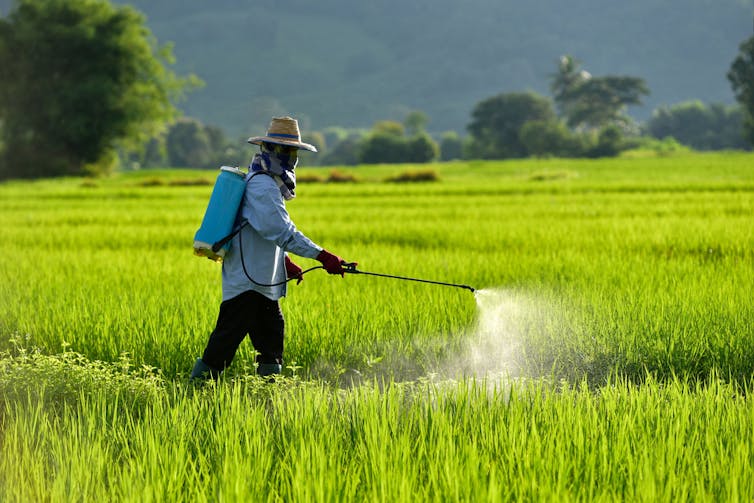
Duleeka Knipe, University of Bristol; David Gunnell, University of Bristol, and Ian Hussey, Ghent University
As many as 800,000 people around the world die every year by suicide, with 76% of these deaths in low and middle income countries like India and China. Between 110,000 and 168,000 people die from self-poisoning using pesticides – the same pesticides which are banned in wealthier countries due to human health and environmental concerns.
In many lower income countries, suicide rates are higher in rural than urban communities. There are likely to be several reasons for this, but it can partly be explained by the accessibility of pesticides in these communities where many households are involved in farming.
Pesticides are typically stored within easy reach at home. Locking the pesticides in secure locations so they are not accessible to suicidal individuals (and young children) is not common practice.
A large proportion of these pesticide self-poisonings are acts of self-harm with low suicidal intent. But because of their high toxicity (some products have a case fatality of over 50%), many suicide attempts using pesticides are fatal. In contrast, in the West, where medicines are frequently taken in overdoses, the risk of dying is much lower.
If a person survives a suicide attempt they are not likely to repeat it. This is certainly the case in Sri Lanka where the incidence of pesticide self-poisoning is very high (318 per 100,000). However, if a highly toxic pesticide is consumed, this often results in death.
Reducing access
There are two main options for reducing access to toxic pesticides: either banning them, or helping farmers to store them securely in their communities. The pesticide industry supports the latter option, and because of their influential position, this is often the approach governments favour.
However, the available evidence for the effectiveness of safer storage has primarily come from small scale studies. These studies are not able to tell us whether safer storage is effective in reducing suicide deaths if rolled out to a larger population.
The only large scale study to address this question that was not funded by the pesticide industry, published in The Lancet in 2017, included 53,000 households and found no evidence that safer storage reduced pesticide self-poisoning or deaths. In practice, studies indicate that within a short period of time, most farmers stopped using the locks or padlocks they were provided with.
In contrast, evidence from a recent systematic review shows that pesticide bans are effective in reducing deaths from pesticide poisoning and, in some cases, overall suicide rates. In one recent study, it was estimated that a series of national pesticide bans in Sri Lanka contributed to an estimated 90,000 suicide deaths being prevented over 20 years.
So research does show that the most effective means of reducing suicide deaths by pesticide poisoning is for a country to ban the sale of these highly toxic substances. Yet that research is slow in being translated into practice. So why is this happening?
Against this backdrop, you might be surprised or dismayed to hear that the pesticide industry has a voice in suicide prevention activities – contributing funding to international suicide prevention organisations and World Health Organisation initiatives.
Leading manufacturers of pesticides worldwide also directly fund research carried out by some of the leading suicide prevention researchers globally.
Conflicts of interest risk
Row back a few decades to a previous controversial area of research and policy. It is common knowledge that tobacco is the world’s greatest preventable cause of cancer – and that one of the main objectives of the tobacco industry is to ensure a market for their product.
In that case, the objectives of the tobacco industry are in direct conflict with the goal of groups trying to prevent cancer. If you found out that cancer researchers were funded wholly or in part by the tobacco industry, you might question the objectivity and rigour of the research produced. In recognition of this, major cancer prevention charities will not support researchers who have received such funding from the tobacco industry.
The risk of conflict of interest has been examined elsewhere in relation to other issues, such as research on artificial sweeteners and weight outcomes, and the development of psychopharmaceutical drugs.

Shutterstock
As researchers, it is always difficult to manage conflicts of interest. Transparency is unanimously argued to be essential, but so is careful consideration of how we collaborate with stakeholders who have interests which may be in direct conflict with our own.
A recent editorial in the Lancet highlights that UN rapporteurs are damning about the “aggressive, unethical marketing tactics of the pesticides industry and the money spent on influencing policy makers and disputing scientific evidence”. We feel there is a substantial risk that this is contributing to the lack of vigour with which the issue of pesticide bans is being pursued by the suicide research community.![]()
Duleeka Knipe, Research Fellow, University of Bristol; David Gunnell, Professor of Epidemiology, University of Bristol, and Ian Hussey, Postdoctoral research fellow, Ghent University
This article is republished from The Conversation under a Creative Commons license. Read the original article.
Further information
Policy Report 20: Preventing suicide in Sri Lanka: Supporting vulnerable populations by Duleeka Knipe, University of Bristol. Published by PolicyBristol.
